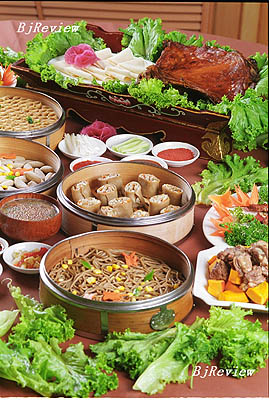By Valerie Sartor
Food is also very important in building relationships
 "Try this; it's good for your health," Chen Lin said, smiling. She deftly picked up a shiny black wood ear mushroom and plopped it in my plate.
"Try this; it's good for your health," Chen Lin said, smiling. She deftly picked up a shiny black wood ear mushroom and plopped it in my plate.
"Isn't there anything not good for me?" I answered, fumbling in my attempt to direct the slippery morsel into my mouth. "And why is most Chinese food cooked? I'd like some raw foods, I miss eating salads."
"Everything has a purpose and, as you noticed, Chinese people eat almost everything. Plus we feel that cooking brings out the medicinal value in food. In fact, there is no clear distinction between food and medicine in Chinese culture," she answered primly. "Food and drugs serve the same purpose, but food nourishes the body while drugs correct physical ailments."
"Food is also very important in building relationships," He Shan, a petite beauty, added. "Business deals are made over banquet tables, friendships develop by eating together and people come to understand each other, as we are doing, by sharing meals. For Chinese, food and friends are inseparable: I would never visit anyone without bringing a gift of food; any get-together without food is considered incomplete and improper."
"But Chinese people aren't fat! How can you be so obsessed with food and stay so slender?" I asked, raising my chopsticks excitedly and pointing at her slender figure.
"Don't point with those chopsticks, please," Chen admonished me. "Chinese people have enjoyed and understood culinary pleasure longer than Western people. Fuxi, a legendary ancestor of the Chinese nation, taught people to fish, hunt, grow crops and cook 20 centuries before Christ was born. Ancient scholars and chefs developed culinary leitmotifs promoting preventative health through diet management and proper cooking. We Chinese designed magnificent culinary presentations and elaborate banqueting rules. Never stick your chopsticks in a bowl of rice; you know that, don't you?"
Grinning, I replied, "I'm not totally barbarian! You've taught me many things but not how to lose weight."
"Eat much more vegetables and less sugar like we do; use meat and fat as condiments," commented He. "America's food god is KFC but we have Confucius. He set culinary standards, wrote about proper table etiquette and balanced diets. Ancient rules still help me decide how many dishes to order, and the types of dishes needed for a certain occasion. To be a good cook or a good hostess you must be a matchmaker, blending flavors, ingredients, colors and tastes to suit the guests."
"So why did you order these dishes?" I asked her curiously.
"Because you are an older woman; the mushrooms are full of nutrients to keep you strong. This soup contains dongquai root; we are all women, that's a very useful medicinal herb for us."
Chen laughed. "And this seaweed is often fed to pregnant moms, but none of us is pregnant, I hope!"
He frowned. "You can laugh, but I'm very concerned with the life giving attributes of food. Cooking not only tenderizes and sterilizes food, but creates tonics as well. Every food has a unique property; when cooked correctly and in balance with other foods the dish will promote health and longevity."
"That's exactly what I need," I assured her. "But it sounds like food is medicine to you, rather than something to satisfy hunger."
"It is not an exaggeration to state that Chinese medicine originated in the kitchen," He answered. "My friend is a traditional Chinese medicine (TCM) doctor; he says Chinese medical thought, including diet and nutrition, feels that no substance is absolutely neutral."
"Well, I'm on a diet; can you tell me approximately how many calories and grams of fat are in these dishes, please?"
Both of the pretty young women laughed uproariously. "Good heavens," Chen said, "You're not fat. A woman your age should even be a bit plump."
"Western diets emphasize calories and balance protein, carbohydrates and fats, but the Chinese approach is grounded in the five-elements-and-eight-guiding-principles theory. All food has yin and yang, warm and cool, dry and wet. You must eat what is good for your type and condition," He explained.
"How do I discern my condition?" I asked, surprised.
"Every Wednesday we go for foot massage: Doctors have said you have much heat in your body, maybe from menopause. So to balance your qi just eat cooling foods," Chen said.
"It will really work?" I inquired.
"Diet, heredity and environment are the three sources of qi; according to TCM, the foods we eat directly influence the excesses and deficiencies in our bodies," He added.
"I'll try anything, ladies," I replied, "But the biggest deficiency is the bitter fact that my boyfriend has left China, maybe forever."
"Eat this red tomato, its sweet and red are good for your heart," Chen advised, patting my arm gently.
(Beijing Review March 26, 2008)